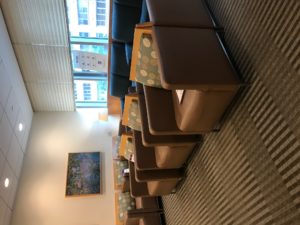 A high degree of tension always accompanies my mammogram appointments. My stress level has gone up, thanks to COVID 19. But I didn’t want to postpone the six-month follow up appointment for a 3-D image of my left breast since some tissue was suspect last time.
A high degree of tension always accompanies my mammogram appointments. My stress level has gone up, thanks to COVID 19. But I didn’t want to postpone the six-month follow up appointment for a 3-D image of my left breast since some tissue was suspect last time.
The Perlmutter Cancer Center at NYU Langone Health in Manhattan seamlessly handled the new and more elaborate check in process. After registering at the front desk, I passed through a series of stations to pick up a mask, sanitize my hands and have my temperature taken. Everyone in the lobby respectfully stood at least six-feet apart from our sister patients.
Only one other woman sat in the third floor waiting room, usually packed with patients waiting for their mammograms, sonograms and other critical tests. A sign on every other chair instructed us not to sit there so that we could keep our distance from others. Within 10 minutes I was called to change into a dressing gown for the exam.

Technicians no longer congregate in a small room between patients, where they handle administrative work. Each one now uses a computer right in the exam room. The technician who did my mammogram has been at her job since the start of COVID since it’s classified as critical. She’s periodically tested for the virus, she told me, but can’t be tested daily. Aside from arranging my breast in the imaging contraption – which takes seconds – she and I weren’t on top of each other.
The radiologist told me that although new spots had appeared on my image, she wasn’t concerned because they’re probably due to the estrogen patch I use. She recommended that I return in six months for another follow up mammogram. When I started to automatically shake her hand and thank her, she chucked and gave me an elbow bump. “Oops, I forgot,” I said.
It’s always impressive when organizations – and of course the people in them – adapt to adverse situations, devising systems and new behaviors that allow them to continue functioning successfully. COVID 19 has certainly forced us to hone our resourcefulness on many levels, professionally and personally.
Adapting to change can be difficult for many of us. I think of a middle aged woman I knew who completely shut herself off from friends after her husband died suddenly, and remained isolated from then on. He was her anchor, but once she lost him, she couldn’t find a new mooring. And a young man who had a devil of a time getting back on his career track after a debilitating accident. Sadly, he couldn’t adapt to his limitations; instead, he let them sideline him decade after decade.
 Contrast these two people to these two: A woman who loses her long-time husband, then moves to a new city, joins a vibrant community center and develops a new circle of friends. She also starts dating a couple of men from the group. And a man who almost loses his life after being hit by a taxi and is hospitalized for months, but fights his way back – day by day – all the while managing to keep his consulting company going.
Contrast these two people to these two: A woman who loses her long-time husband, then moves to a new city, joins a vibrant community center and develops a new circle of friends. She also starts dating a couple of men from the group. And a man who almost loses his life after being hit by a taxi and is hospitalized for months, but fights his way back – day by day – all the while managing to keep his consulting company going.
I recently heard the interesting term “lifequake,” which is an event that suddenly changes your life. Every single one of us experiences them, some more than others. Sometimes, we even cause our own lifequakes, say when we leave a secure job to start our own business or stop drinking after 40 years, even though it was such an integral part of our life.
Millions of us are now going through the same lifequake. We didn’t ask for it, but just like a town that rebuilds itself after an earthquake, we must reconstruct our lives so we’re stronger than ever.

